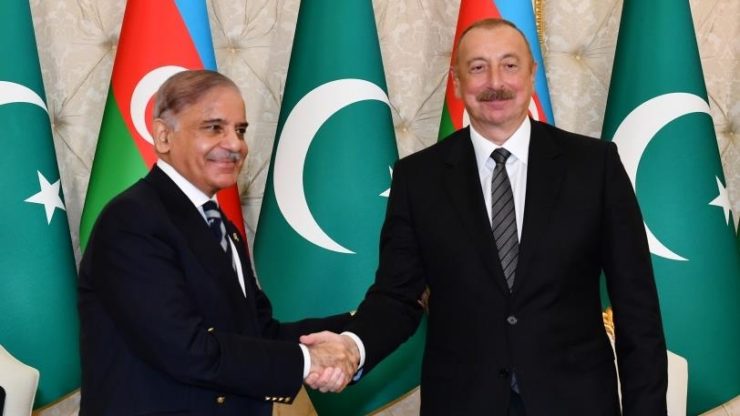
Pakistan has long been vying for expanding its economic relations with the Central Asian countries. The state resolved to follow a foreign policy based on geo-economics under the tenure of the PTI, abandoning the previous one based on geostrategic issues. The Central Asian region holds immense economic potential. The Pakistani leadership has been engaging with different Central Asian countries to materialize this ambition. The landlocked Central Asian countries could also benefit from cordial relations with Pakistan, as the latter can provide them access to the deep sea. The recent visit of the President of Azerbaijan, Ilham Aliyev, is a great step in strengthening bilateral relations between the two countries. Both sides have signed numerous agreements which would not only strengthen their relations but will also increase their economic strength.
Bilateral Relations and Diplomatic Milestones
President Ilham Aliyev recently visited Pakistan at the invitation of Pakistani Prime Minister Shehbaz Sharif from July 11th to 12th. This visit has marked a significant milestone in the bilateral relations between Islamabad and Baku. This visit has further cemented the bilateral economic and diplomatic ties between the two sides. The evolving geostrategic landscape of the global system has made the economic interests of the states overwhelmingly significant. Moreover, increasingly altering geostrategic and geopolitical realities, socioeconomic scenarios, and the rise of a multipolar world order have prompted both countries to forge bilateral relations.
During this meeting between the leadership of the two countries, 15 Memoranda of Understanding (MoUs) were signed, covering various domains including preferential trade, tourism, transit trade, information technology, cultural exchange, air services, and science and technology. Azerbaijan’s Deputy Foreign Minister, Samir Sharifov, arrived in Pakistan, before the arrival of Ilham Aliyev, to hold meetings with different Pakistani ministers.
Geostrategic and Economic Significance
The Pakistani leadership demonstrated a strong desire to strengthen bilateral relations by hosting Azerbaijani officials. Optimistically, this enhancement of relations will lead to further cooperation on regional connectivity, public-private collaboration, the North-South Corridor, investment, textiles, food and energy security, defense cooperation, and socioeconomic integration in the future.
According to various sources, both sides engaged in discussions on several areas of mutual interest to further cement their bilateral cooperation. During this summit, both the countries agreed to boost their bilateral investment up to 2 bn USD in different projects mutually beneficial for both the states. In a joint press conference by the two leaders, Pakistani Prime Minister Shehbaz Sharif stated, “We have discussed an initial figure of $US2bn of investment in mutually beneficial projects.” Azerbaijan and Pakistan are the two key players in the Muslim world. They play a pivotal role in the affairs of the world nations. Moreover, they share a common vision in political, strategic, social, and economic domains.
The key rationale behind this visit of President Ilham Aliyev is to enhance diplomatic engagement between the two countries located in two distinct regions. Although both countries are territorially disconnected, they hold significant potential to support each other’s economy. The MoUs signed during this meeting manifest that both states are ready to help each other’s economic ambitions at all levels. Moreover, Pakistan and Azerbaijan are also willing to explore new avenues of cooperation in different domains.
Political and Security Collaboration
During this visit of Azerbaijan’s President to Pakistan, both sides cherished the political cooperation and coordination between the two countries. On the political front, both countries share similar problems. Pakistan and Azerbaijan both suffer from irredentist claims. Pakistan’s Kashmir issue and Azerbaijan’s former Karabakh issue hold similar status. These issues have directed the leaders of the two nations to bolster their security and defense collaboration. Pakistan and Azerbaijan also participated in trilateral military exercises, Three-Brothers 2021, with Turkey. This collaboration between the three key powers of the Muslim world inflicted confidence in Azerbaijan’s strategic spheres and led to its victory against its arch-rival, Armenia. Therefore, it would not be fallacious to hold that Karabakh and Kashmir issues were the prime drivers behind increasing collaboration and cooperation between Islamabad and Baku.
Azerbaijan possesses substantial natural resources, including gas and oil, which can help Pakistan combat its energy crisis. In 2022, Baku’s mineral production was reported to stand at 61,270,470 metric tons. Pakistan can benefit from these mineral resources as well. Musadiq Malik, the Petroleum Minister of Pakistan, also held, after the recent visit of the President of Azerbaijan, that the latter was considering investing $2 to $3 bn in Pakistan. Azerbaijan also has a lot to gain from this partnership and collaboration. Pakistan holds one of the deepest seaports in the world. Landlocked Azerbaijan can use this seaport for trade and connectivity with the rest of the world. The China-Pakistan Economic Corridor (CPEC) also provides a significant opportunity to both the states for connectivity and cooperation. Azerbaijan can access the South Asian markets by connecting to the CPEC. There are opportunities for both sides to collaborate in diverse fields such as investments, economy, Special economic zones, joint ventures, CPEC, and agriculture.
Taut Bataut – is a researcher and writer that publishes on South Asian geopolitics, exclusively for the online magazine “New Eastern Outlook”.
